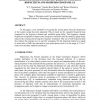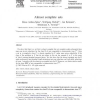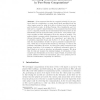588 search results - page 8 / 118 » Reducibility and Completeness in Private Computations |
SIVP
2008
13 years 7 months ago
2008
In this paper, a new method for extracting the system phase from the bispectrum of the system output has been proposed. This is based on the complete bispectral data computed in t...
INFOCOM
2011
IEEE
12 years 11 months ago
2011
IEEE
Abstract—Large-scale data processing needs of enterprises today are primarily met with distributed and parallel computing in data centers. MapReduce has emerged as an important p...
HUC
2007
Springer
13 years 11 months ago
2007
Springer
Abstract. This study has created the Playful Tray that adopts Ubicomp and persuasive techniques into play-based occupational therapy for reducing poor eating behavior in young chil...
STACS
2000
Springer
13 years 11 months ago
2000
Springer
We show that there is a set that is almost complete but not complete under polynomial-time many-one (p-m) reductions for the class E of sets computable in deterministic time 2lin ...
ASIACRYPT
2005
Springer
14 years 1 months ago
2005
Springer
Abstract. A two-argument function is computed privately by two parties if after the computation, no party should know anything about the other inputs except for what he is able to ...



